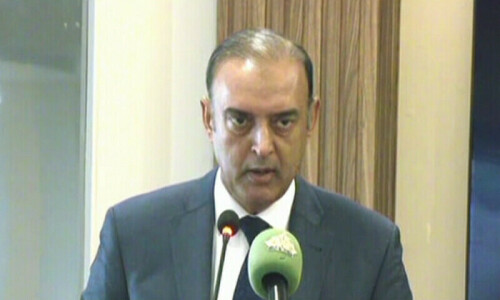KARACHI: The Pakistani stock market experienced nothing less than bloodbath in three of the five sessions in the outgoing week which wiped off 1,630 points (3.9 per cent) from the KSE-100 index.
After fall from two crucial levels of 42,000 and 41,000, the index managed to settle slightly over the 40,000 level at 40,071. The market was plagued by hostile news flow for most part of the week, starting from corporates coming up with weak earnings reports and the rise in new coronavirus cases that frightened the provincial government into clamping micro smart lockdown in hotspots of Karachi.
It did a lot of damage to business and industrial confidence as people feared another round of complete lockdowns that might hit the economy. But the major blow to investor sentiments was delivered by the flare up in political temperature after the opposition coalition meetings which were also addressed by the former PM Nawaz Sharif from London.
On the international front, the surge in pandemic cases which dragged down oil prices sent the shares in energy sector reeling. The fear was exacerbated after the US President Donald Trump tested Covid-19 positive only a month before elections.
Early in the week, the market briefly gained some respite following Asian Development Bank’s approval of $300 million for supporting capital markets, followed by the rupee appreciating against the dollar. However, any positive impact proved short-lived.
Foreign selling clocked in at $8.3m, compared to net sell of $10.5m the preceding week. Outflow was witnessed in commercial banks amounting to $4.2m and cement $3.2m. On the domestic front, while mutual funds remained the major net sellers of shares worth $20.5m, prompted by redemption requests. Insurance bought stocks worth $15.3m and banks were net buyers of stocks valued at $12.4m.
Average volume dropped 16pc to 391m shares while mean value traded settled 1pc lower at $83m in the outgoing week. Sector-wise negative contributions from fertilizer, lower by 190 points, cement 179 points, oil and gas marketing companies 164 points, oil and gas exploration 159 points, and commercial banks 157 points.
Refnieries, automobile assemblers and engineering were the major laggards. Scrips that dragged the index down included Hascol, lower by 61 points, TRG 61 points, Systems Ltd 60 points, United Bank 58 points and Hub Power 57 points.
Going forward, pundits predicted slowdown in profit-taking as equities had receded to attractive levels. Economic indicators were believed to be on the mend while the country appeared to be far away from any panic regarding pandemic and the political upheaval did not display any imminent danger to the government.
Yet, the sentiments could be impacted by any meltdown in international markets. On the positive side, fresh liquidity injections from local and foreign investors amidst soft monetary policy outlook in the near to medium term and new initial public offerings in the pipeline were expected to instill investor interest in equities.
Major news during the outgoing week included: World Bank agreed to $450m loan for renewable energy projects, POL sales dipped 2pc month-on-month in Sept; FBR surpassed tax collection target for 1QFY21. Moreover, the government reduced prices of High Speed Diesel (HSD) by Rs2.40 to Rs104.10 per litre and kept petrol price unchanged, though the gas tariff was raised for commercial consumers. Lastly, liquid foreign reserves of country slipped by $369m to $19.53 billion.
Published in Dawn, October 4th, 2020














































